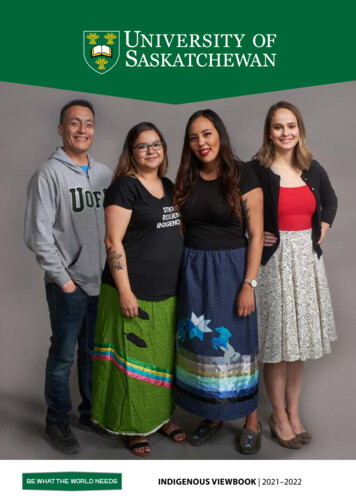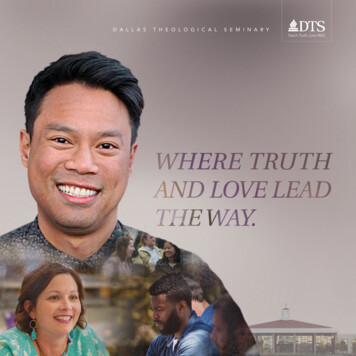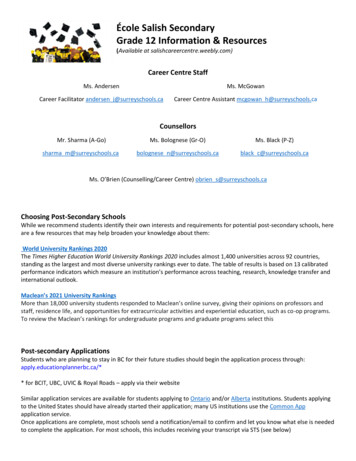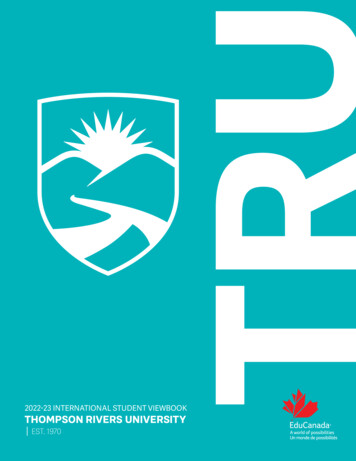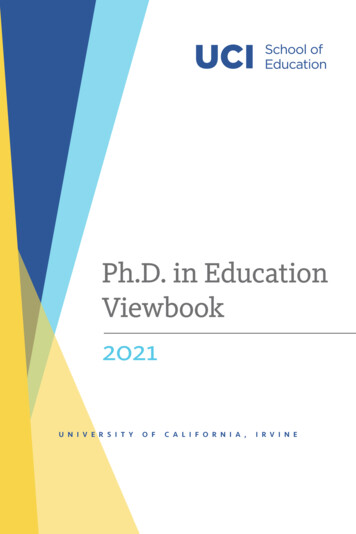
Transcription
Ph.D. in EducationViewbook2021U N I V E R S I T YO FC A L I F O R N I A ,I R V I N E
2Why a Ph.D. in Education at UCI?3Areas of Focus4Our Faculty6Community-Engaged Initiatives10Our Culture12Student Profiles13Alumni Profiles19About UCI22About Orange County & Irvine23Funding & Application Requirements24ContentsDean’s Welcome
Dean’s WelcomeThank you for your interest in the UCI School of Education’sPh.D. in Education program. As you will learn from thisviewbook, our doctoral program is focused on advancingeducational sciences and contributing to improved educationalopportunities and outcomes for individuals across the entirelifespan. We are a diverse, dynamic, and collaborativeinterdisciplinary unit, and our research, community partnerships,and programming are dedicated to producing innovativescholarship, addressing the needs of local schools, andpreparing students for careers in academia, nonprofits,government, and the private sector.At the UCI School of Education, there are an expansive set ofresearch opportunities to pursue and faculty with whom youcan collaborate. As of July 2021, our faculty were principal investigators on grants whosecombined total exceeded 110 million – and the research on these grants creates excitingopportunities for the contributions of doctoral students. The curriculum at our school drawson perspectives from neuroscience, economics, sociology, psychology, improvement science,and more. At the School of Education, you will have an unparalleled chance to grow into aconscientious and well-rounded scholar.The University of California, Irvine is consistently recognized as a leader in higher education.In 2019, Money ranked UCI the No. 1 Best College in the nation. UCI was also ranked the“No. 1 university doing the most for the American dream” by the New York Times and rankedNo. 2 in the nation for diversity by the Wall Street Journal.Our campus is in the heart of Orange County, the nation’s sixth most populous county.Surrounding us is a diverse K-12 student population and dozens of school districts whosegoals and demands are rapidly evolving. Through strategic partnerships, you will have theopportunity to work on the ground floor with local schools to create tangible improvementsfor our county’s students and teachers.I invite you to explore this viewbook to learn more about what makes our community special.If you have any questions, please contact our Student Affairs Office, whose information canbe found on page 24.I hope to see you in the fall.Sincerely,Richard ArumDean and ProfessorUniversity of California, Irvine School of Education2
Why a Ph.D. in Education at UCI?Focus your research in one of three areas (see page 4)Collaborate with world-renowned faculty who, combined, areprincipal investigators on 110 million in grants (1)Conduct research in the heart of Orange County, the nation’s sixthmost populous county, featuring 28 school districts and 500,000 K-12 studentsStudy at the No. 15 graduate school of education in thenation – No. 7 among public universities (2)Receive guaranteed funding for five years, along with funding for travelto attend and present at national conferencesSpark inspiration from the No. 1 university doing the most for theAmerican dream (3)Join students with a vast array of backgrounds: students historicallyhail from dozens of states and countries, and have a wide range of work andeducational experiencesLive on-campus in beautiful Orange County with five years of graduatehousing – 15 minutes to the beach!1 – Data as of July 20212 – U.S. News & World Report “2022 Best Education Schools”3 – New York Times, 2017 College Access Index3
Areas of FocusStudents in the Ph.D. in Education program are required to take12 courses total, and have the ability to focus their research in oneof three areas.At the UCI School of Education, doctoral students are notcommitted to working with one professor for the entirety of theirstudies. Rather, students can work with different faculty astheir research interests evolve. As a result, students becomewell-rounded scholars exposed to a variety of research areas.Collectively, students can pursue research that studies humandevelopment across the entire lifespan – from infancy to seniorcitizens – and the associated learning opportunities and outcomes.4
Educational Policy and Social Context (EPSC)Drawing from economics, sociology, developmental psychology, and anthropology,EPSC faculty and students use a range of quantitative, qualitative, and mixedmethod approaches to understand impacts of existing policies, to design andevaluate new policy and intervention models, and to understand the relationshipbetween policy making and implementation.Human Development in Context (HDiC)Drawing on education, cognitive science, neuroscience, developmental psychology,and anthropology perspectives, faculty and students conduct lab experiments,engage in field-based studies, and use longitudinal data sets to examine humandevelopment in a wide range of areas. Research in this area contributes to buildingtheory on human development across the lifespan and intervention efforts.Teaching, Learning and Educational Improvement (TLEI)Drawing on a range of research perspectives, TLEI students investigate teachingand learning in schools, communities, online settings, and informal learningcontexts across a range of disciplines. Students utilize case studies, design-basedimplementation research, research-practice partnerships, evaluations of learningoutcomes, and text and data mining to improve the life chances of children andadults through education.5
Our FacultyThe UCI School of Education is home to a diverse and internationally recognized groupof faculty dedicated to research that advances educational science and improves learningoutcomes for all students, regardless of background. As of July 2021, our faculty wereprincipal investigators on 102 grants whose combined total exceeded 110 million. Withdozens of research grants dedicated to a wide-range of issues, doctoral students haveample opportunity to collaborate with faculty on cutting-edge, high-impact research.June Ahn, Associate Professor:Learning Technologies, ResearchPractice Partnerships, HumanComputer Interaction, EducationalTechnology, Data Use & AnalyticsRichard Arum, Dean, Professor:Legal & Institutional Environmentsof Schools, Social Stratification,Digital EducationDrew Bailey, Associate Professor:Mathematical Development,Individual Differences,Longitudinal MethodsRachel Baker, Associate Professor:Educational Policy, Inequality, HigherEducation, Economics of EducationLiane Brouillette, Professor:Educational Leadership, SchoolReform, Arts EducationAndres Bustamante, AssistantProfessor: Early ChildhoodScience Education, Head Start,Approaches to Learning,Community-Based Intervention6
Gustavo Carlo, Professor: Prosocial& Moral Development, Child &Adolescent Development, Parenting& Families, Risk & Resilience, CrossNational & Cross-Cultural ResearchBen Castleman, Associate Professor:Behavioral Economics, Applied DataScience, Research-Policy Partnerships,Randomized Controlled Trials, EducationTechnologyBeginning in July 2022Penelope Collins, Associate Professor:Reading & Writing Development,Bilingualism & Biliteracy, DigitalLiteracy, Academic Language,Engagement in LiteracyGil Conchas, Professor: Diversity& Equity in Education, Race &Urban Education, Immigration,School ReformAnneMarie Conley, AssociateProfessor: Motivation in Education,Adolescent Development, PersonCentered Approaches to StudyingChangeShayan Doroudi, Assistant Professor:Educational Data Sciences, EducationalTechnology, Learning SciencesNia Dowell, Assistant Professor:Learning Analytics, ComputerMediated Collaborative Interaction,Computational LinguisticsGreg Duncan, DistinguishedProfessor: Economics of Education,Program Evaluation, ChildDevelopmentJacquelynne Eccles, DistinguishedProfessor: Academic Motivation &Achievement, School & FamilyInfluences on Adolescent Development,Gender & Ethnicity in STEM FieldsGeorge Farkas, DistinguishedProfessor: Achievement Gap,Educational Inequality, EarlyChildhood, Afterschool ProgramsBrandy Gatlin-Nash, AssistantProfessor: Achievement Gap, Culture &Learning, Diversity & Equity, Language& Literacy Acquisition & Instruction,Learning Disabilities, LinguisticDiversity, Race & Urban Education,Teacher Education, WritingShane Goodridge, Assistant TeachingProfessor: Educational History,Philosophy, Charter School Movement7
Susanne Jaeggi, Professor:Cognitive Training Interventions,Working Memory & CognitiveFunctions Across the LifespanJade Jenkins, Associate Professor:Early Childhood Development,Child & Family Policy, PolicyAnalysis & Management, ProgramEvaluationHosun Kang, Associate Professor:Science Education, Teaching & TeacherEducation, STEM, Gender, Identities,Social Justice, Diversity & EquityYoung-Suk Kim, Professor, Sr.Associate Dean: Language & LiteracyAcquisition & Instruction, Early LiteracyPredictors, Reading Fluency, ReadingComprehension, WritingJudith Kroll, Distinguished Professor:Bilingualism, Second LanguageLearning, Psycholinguistics, CognitiveNeuroscience, Gender & ScienceCarol Booth Olson, ProfessorEmerita: Academic Writing,Language Arts, Adolescent LiteracyElizabeth Peña, Professor, AssociateDean of Faculty Development andDiversity: Bilingualism, LanguageImpairment, Test Development &TreatmentEmily Penner, Assistant Professor:Educational Inequality, EducationPolicy, K-12 Educational Interventions,Family & Peer Impacts on AchievementKylie Peppler, Associate Professor:Intersection of Arts, ComputationalTechnologies & Interest-DrivenLearningStephanie Reich, Professor:Socio-Emotional Development,Parent-Child Interactions, PeerNetworks, Affordances ofTechnology and MediaKatherine Rhodes, AssistantProfessor: Mathematical Cognition,Language Ability, Cognitive ControlLindsey Richland, Professor,Associate Dean of Graduate Program:Children’s Reasoning, Higher-OrderThinking, Mathematical Thinking,Executive Function8
Fernando Rodriguez, AssistantProfessor of Teaching: Study Methods,STEM Education, Learning AnalyticsJudith Haymore Sandholtz, Professor:Teacher Professional Development,Teacher Education, School-UniversityPartnershipsRossella Santagata, Professor:Mathematics Education, Video &Multimedia in Teacher Learning,Culture & Learning, Equity & EducationSandra Simpkins, Professor: OrganizedAfterschool Activities, Motivation,Family Influences, Diversity & Equity,Immigration & Culture, STEMElizabeth van Es, Professor:Teacher Preparation & ProfessionalDevelopment, Teaching Mathematicsfor Equity, Teaching Practice, Video &Teacher Learning, Design of LearningEnvironmentDeborah Lowe Vandell, Chancellor’sProfessor Emerita: DevelopmentalProcesses & Educational Outcomes,Longitudinal Research Methods, EarlyChildhood Education, AfterschoolPrograms, Teacher-Child RelationshipsAdriana Villavicencio, AssistantProfessor: Inequities in Education,Racial Equity Frameworks, EnglishLearning & Immigrant StudentsMark Warschauer, Professor:Digital Learning, Language &Literacy, STEM, Learning AnalyticsJulie Washington, Professor:Intersection of Literacy, LanguageVariation, & Poverty, Use &Development of African AmericanEnglish, Achievement Gap, LanguageDevelopment, Language DisordersDi Xu, Associate Professor: EconomicReturns to Higher Education, FinancialAid to Higher Education, Effects ofGovernmental Policies & Projects onEducational Equity & Efficiency9
Community-Engaged InitiativesThe UCI School of Education is home to several initiatives intendedto foster community-driven solutions to education issues, problems,and inequities faced by our local communities with implicationsfor national and global impact. As a doctoral student, you have theopportunity to partner with faculty, schools and local communitiesto design programs that are informed by the most up-to-dateresearch on teaching and learning across the PK-12 universityspectrum, teacher learning and professional development, policyand systemic approaches to educational improvement, issues ofequity and social justice, and human development. See below forsome of these initiatives.For a full list of labs and centers hosted by the School of Education,visit education.uci.edu/centers.htmlCALIFORNIA TEACHER EDUCATIONRESEARCH AND IMPROVEMENTNETWORK (CTERIN)CTERIN is a state-wide, cross-universityresearch center focused on the studyof teacher preparation. As part of thisproject, researchers have organized anetworked improvement communityconsisting of teacher educators acrossthe nine UC teacher preparationprograms. This group is collaboratingon a shared problem of practice: howto prepare candidates to supportmultilingual learners in the classroom.10CENTER FOR RESEARCH ONTEACHER DEVELOPMENT ANDPROFESSIONAL PRACTICE (CRT)The CRT fosters collaborations amongfaculty, students, and practitioners onprojects focused on a variety of aspectsof teacher development and learningand on the study of teaching andteacher professional practice and of thesystems in which these are embedded(including school and districtleadership).
ORANGE COUNTY EDUCATIONALADVANCEMENT NETWORK (OCEAN)OCEAN is a network of partnershipsbetween the School of Educationand K-12 schools and nonprofitorganizations. In each partnership, agraduate student and faculty memberwork with school leadership to identifythe greatest needs and goals of theschool, and in turn conduct researchthat will positively impact the school.UCI TEACHER ACADEMYThe UCI Teacher Academy creates acontext where teachers collaborate,inspire and lead others in transformingtheir instruction. The Teacher Academyprovides a home for teachers andschool leaders to develop and enhancetheir professional practice by offeringprograms that support teacherpreparation, professional development,teacher leadership, and administratorleadership.11
Our CultureThe UCI School of Education strives to create an inclusive culturethat is supportive of students of all backgrounds. In addition toconducting research that improves the educational opportunitiesand outcomes of diverse populations, the school is home to severalprograms and initiatives that support doctoral students and areaimed at fostering free speech, equity and inclusive excellence.THE PEOPLE’S COALITIONThe People’s Coalition (TPC) atUniversity of California, Irvine, is agrassroots social justice group thatorganized during the George Floydprotests in response to the antiBlackness and systemic racismpresent in organizations across theUnited States. TPC is open to all andincludes students, staff, faculty andresearchers who are developingdifferent initiatives focused on makinglong-term structural changes at theSchool of Education. In its first year,TPC developed an UndergraduateSupport Hub, an Anti-Racism Clinic, aSummer Learning Institute, and aCritical Race Theory conference.DIVERSE EDUCATIONALCOMMUNITY AND DOCTORALEXPERIENCE (DECADE)In collaboration with the UCI Office ofInclusive Excellence, DECADE providesa diverse group of UCI graduatestudents a supportive community offaculty, staff, and students, resourcestailored to fit specific needs, and a widevariety of professional developmentand leadership opportunities.DECADE seeks to improve inclusiveexcellence by increasing theparticipation and retention of womenand underrepresented minorities ingraduate programs.12UCI SCHOOL OF EDUCATIONCLIMATE COUNCILThe climate council advises the Schoolof Education community on issuesrelated to inclusion, diversity, equity,and advancement. The council iscommitted to promoting dignity andrespect for all members of ourcommunity, and strives to supporta climate where everyone makes adifference through learning, education,and leadership. Doctoral students areinvited to participate on the councilalongside staff, faculty, undergraduatestudents, MAT students andpostdoctoral scholars.
STUDENT PROFILESDoctoral students at the UCI School of Education study a widerange of issues that affect human learning and development.They are paired with leading faculty who share similar researchinterests and who help the doctoral student grow into awell-rounded academic.There is not a “typical” doctoral student at the UCI School ofEducation. Students historically matriculate from multiple countriesand states and have varied work experiences and undergraduatemajors of study. Typically, half our doctoral students have a master’sdegree, and half have prior teaching experience. Additionally, ourstudents vary widely in age, and many are parents.Our students serve as teaching assistants, graduate studentresearchers, mentors to undergraduates, and leaders of studentinitiatives across campus. For a full directory of our doctoralstudents, please visit ela Alvarez-VargasAdvisor: Associate Professor Drew BaileyFourth-year doctoral student Daniela Alvarez-Vargas developed a love for research on childdevelopment while helping raise her younger siblings, and a desire to help students thrive inmath when she found herself and others being steered away from mathematical professionsby systematic forces. Educational interventions helped her earn her a B.A. in Psychology witha minor in Statistics from Florida International University, which equipped her for pursuingher doctoral degree at the UCI School of Education. A line of her work focuses on identifyinghow causal inference methods can be used to calculate accurate forecasts of the long-termimpacts of math interventions. “I want to improve current approaches to interventiondesign, implementation, and evaluation to ensure equitable and self-sustaining educationalprograms that serve historically marginalized students.”13
Ashlee BelgraveAdvisor: Assistant Professor Andres BustamanteThird-year doctoral student Ashlee Belgrave joined the UCI School of Education to engagein community-based research. Ashlee’s motivation to pursue such research is informed bystrong familial and cultural ties with her community. Through her work as a CommunityResearch Fellow in the Orange County Educational Advancement Network (OCEAN), Ashleehas engaged in partnerships with local school districts to conduct usable and relevantresearch that supports students and their families. “My research interests include examiningmechanisms for leveraging university resources to create educational interventions andprogramming that supports educational equity and culturally relevant learning.” In thefuture, Ashlee will continue to partner with OCEAN and the UCI Center for EducationalPartnerships, where she will work alongside high school students to explore college readinessand build educational programming.Socorro CamberoAdvisors: Associate Professor June Ahn and AssistantProfessor Adriana VillavicencioThird-year doctoral student Socorro Cambero continued her educational journey at the UCISchool of Education after graduating with a double major in Education Sciences and Genderand Sexuality Studies with a minor in Queer Studies from UCI. “As a graduate student,I’ve received extensive research support from leading scholars in teacher education anddepartments across UCI. Further, the research centers, such as the Center for Research onTeacher Development, provided me with opportunities to continue nurturing my researchskills in the study of science teacher education.” As a community research fellow in theschool’s Orange County Educational Advancement Network, Socorro is exploring howculturally responsive practices were employed during the pandemic. “I aspire to conductresearch grounded in the lived experiences of marginalized students to create meaningfullearning experiences in science.”14
Melissa DahlinAdvisors: Professor Stephanie Reich, Associate ProfessorJade JenkinsBefore enrolling at the UCI School of Education, fifth-year doctoral student Melissa Dahlintaught preschool in Taiwan for five years, earned a master’s degree in InternationalEducational Development at Columbia University, spent six years in Washington, D.C. inpolicy and evaluation work, and volunteered with the Homeless Children’s Playtime Project.“The School of Education’s doctoral program is preparing me to return to the field with muchstronger analytic skills and deeper content knowledge to do this work well.” For her doctoralstudies, Melissa is focusing on childhood development, parenting, and early childhood policy.She complements her research work by serving as president of the Associated DoctoralStudents in Education and as a mentor through the School of Education’s Diverse EducationalCommunity and Doctoral Experience. She has served as a School of Education representativeto Associate Graduate Students and a board member for the Orange County Association forthe Education of Young Children.Hye Rin LeeAdvisor: Distinguished Professor Jacquelynne EcclesFourth-year doctoral student Hye Rin Lee is enriching her study of achievement motivationas a member of four different research teams. On a project with Distinguished ProfessorJacquelynne Eccles and the UCI School of Engineering, Hye Rin is researching how to leverageYouTube to increase STEM persistence and identity. Research with Associate ProfessorDrew Bailey is examining associations between various motivational constructs. A projectwith Assistant Professor of Teaching Fernando Rodriguez aims to understand students’motivation in an online context. Lastly, research with Dean Richard Arum on the NextGeneration Undergraduate Success Measurement Project team is examining the undergraduateexperience at UCI. In addition to her academic pursuits, Hye Rin appreciates the “close-knitcommunity among graduate students” at the School of Education. Hye Rin is looking forwardto continuing her research interests as a professor at a research institution.15
Jonathan MontoyaAdvisor: Professor Mark WarschauerThird-year doctoral student Jonathan Montoya chose to attend the UCI School of Educationbecause of the close relationships with the local community and school districts. Jonathan’stime as a high school biology teacher, Career Technical Education (CTE) department chair,and community college instructor encouraged his enrollment in the School’s doctoralprogram to explore STEM education and how CTE pathways include or exclude marginalizedcommunities. Currently, Jonathan is a Ridge 2 Reef National Science Foundation fellow,and is also working with researchers from the Center for Integrated Facility Engineering atStanford University to study workforce pathways from secondary to post-secondaryeducation. When asked about his future plans, Jonathan explains, “I would like to continueto do research in service to my community.”.Khamia PowellAdvisors: Distinguished Professor Jacquelynne Eccles,Assistant Professor Adriana VillavicencioBefore coming to UCI , fifth-year doctoral candidate Khamia Powell taught in Title-I schools,serving the most vulnerable and underserved communities along the outskirts ofWashington, D.C. and Atlanta metropolitan. “I loved teaching, but noticed that the highexpectations, positive teacher-student interactions, and love that defined our classroomculture and learning was not the experience for similar students of color in classrooms nextdoor or down the hall.” Looking to make a larger impact on students of color, shematriculated to the School of Education to examine the influence of an intervention thatfocuses on the development of empathy and critical consciousness as a method to facilitate,motivate and support the enactment of culturally responsive teaching. She hopes thisresearch will inform the professional development of teachers who feel supported andempowered in ways that promote the enactment of more culturally responsive practice. “Icame here to support our commitment to serving the most vulnerable of populations and tobe an advocate for my students of color and their communities. I additionally aspire toadvance UCI’s mission of inclusive excellence, which seeks to dismantle systemic barriers ofracism and discrimination that have far too long been the norm.”16
R. Mishael SedasAdvisor: Associate Professor Kylie PepplerA third-year doctoral student, R. Mishael Sedas’ engineering background and professionalexperience with an international nonprofit led to his goal of improving STEM, Art and Designeducation to be more accessible, diverse, and inclusive for minority populations. “I amparticularly interested in out-of-school learning environments, such as home, youth clubs,makerspaces, public libraries, museums, and science centers.” Mishael is now studyingthe interest-driven and “frugal-informal” engineering design practices of Latinx youth. Hebelieves that higher education institutions could leverage these practices to foster andenhance “formal” engineering learning and design literacy. “Ultimately, design literacy canempower educators (including families) to become co-designers of effective educationalexperiences for this rapid-changing world with complex challenges ahead.”.John SzuraAdvisor: Associate Professor Penelope CollinsPrior to his studies at UCI, fourth-year doctoral student John Szura earned his bachelor’sdegree in Psychology from Purdue University Northwest. His research centers onunderstanding how educators utilize educational technologies to facilitate their courses,the experiences that are shared through the use of such technology, and the academicoutcomes that result. These interests have led John to work on projects that examinestudent course choice and performance in remote learning courses, the value in utilizingtelepresence robots as instructional tools, and exploring the diverse experiences shared atafter-school programs that incorporate 21st century technologies in their programming.“Outside of research, UCI has given me the chance to nurture my passion for mentorship andteaching as a participant in the many opportunities offered through DECADE (DiverseEducational Community and Doctoral Experience), the Division of Teaching Excellenceand Innovation, and the School of Education.”17
Joseph WongAdvisor: Professor Lindsey RichlandThird-year doctoral student Joseph Wong selected the UCI School of Education for itscommitment to cross-functional research in cognitive science, digital learning, andeducational technology. As a learning experience designer and researcher, Joseph ismotivated by questions at the intersection of science education, digital media, and higherorder thinking. Currently, Joseph is a lead researcher on Professor Lindsey Richland’sNSF RAPID grant, which evaluates the impacts of COVID-19 stressors on UCI students’distance-learning experiences by identifying the cognitive mechanisms underlying learners’self-efficacy and task-value beliefs, anxiety, mind-wandering, and online engagement.This foundational research will inform the efficacy of and design for undergraduate coursesat UCI. “As a first-generation Burmese American student and recent 2020 NSF graduateresearch fellow, my career goal is to bridge together my passion for digital mediatechnologies with human cognition to design and facilitate transformative learningexperiences representative of today’s 21st century student learning behaviors.”18
ALUMNI PROFILESOur alumni are trained in a multitude of approaches to studyinglearning, human development, and educational outcomes. Thisholistic approach makes our alumni attractive candidates for jobsin several industries – academia, nonprofit, and private business.You can find our alumni working as professors at universitiesacross the country, leading research at education think tanks andnonprofits, and heading up companies and schools they founded.Alumni of the School of Education’s doctoral program are currentlyemployed across the globe, including more than a dozen statesand China, Hong Kong, Kenya, and Korea.Tarana Khan, Ph.D. ’19PBS SoCal Education Research and Evaluation AnalystFor Dr. Tarana Khan, the opportunity to work with renowned scholar and DistinguishedProfessor Jacquelynne Eccles was the driving force for choosing the UCI School ofEducation. Now, Khan is using skills she learned as a doctoral student in her position withPBS SoCal’s Family Math Initiative. “Studying at the School of Education taught me howto be a conscientious researcher, how to present research in a way that is accessible andimpactful, and how to look at data with a careful scrutinization.” Khan ventured to UCIfrom her home in Austin, Texas, expecting to find a culture of collaboration and support andwas not disappointed. For her dissertation, Khan explored undergraduate beliefs about themalleability of their intelligence, their beliefs about the causes of their successes and failures,and how these beliefs impact motivation and achievement in school. Her findings – thatan ability-focused component may be a crucial part of student motivation – have thepotential to inform ongoing large-scale mindset interventions.19
Joyce Lin, Ph.D. ’16Assistant Professor, California State University, FullertonDr. Joyce Lin chose the UCI School of Education in large part because of Southern California’sethnic and socioeconomic diversity. “In addition to studying with a multidisciplinary teamof faculty, I wanted to conduct research with and serve the communities that I grew up in.”Lin’s doctoral research focused on how distal parenting contexts are related to the homeenvironments of young children; her mixed-method dissertation specifically addressedhow
Why a Ph.D. in Education at UCI? 1 - Data as of July 2021 2 - U.S. News & World Report "2022 Best Education Schools" 3 - New York Times, 2017 College Access Index Focus your research in one of three areas (see page 4) Collaborate with world-renowned faculty who, combined, are principal investigators on 110 million in grants (1) Conduct research in the heart of Orange County, the .



